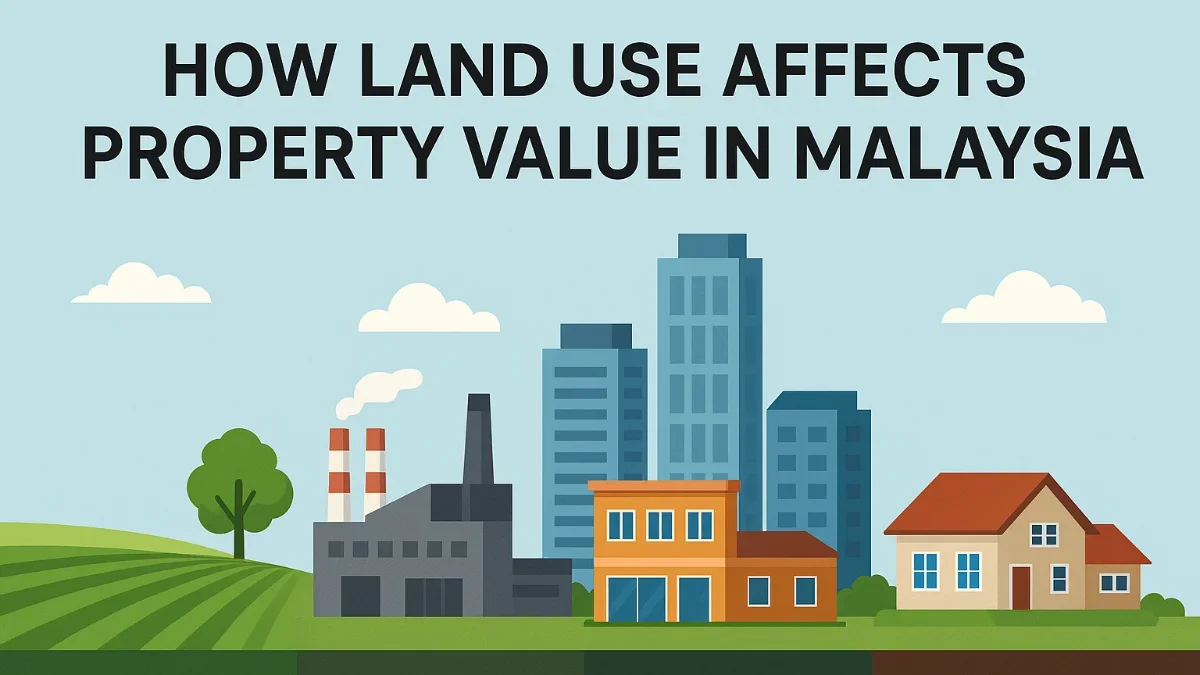Explore how different land use categories—agricultural, industrial, commercial, and residential—impact land value, investment demand, and resale potential across Malaysia.
Introduction
In Malaysia, not all land is created equal. Two plots of land of similar size can have drastically different values—purely because of zoning. Whether you’re an investor, developer, or landowner, it’s vital to understand how land use classification affects property value, demand, and resale returns.
This blog breaks down the impact of agricultural, industrial, commercial, and residential zoning on property pricing in Malaysia.
The Role of Land Use in Property Valuation
Every plot of land in Malaysia is assigned a specific land use (kegunaan tanah) under the National Land Code. These classifications define what the land can legally be used for—and directly impact:
-
Price per square foot
-
Development potential
-
Capital appreciation
-
Rental yield
-
Buyer demand
Key Land Use Categories and Their Value Impact
1. Agricultural Land (Tanah Pertanian)
-
Typical Price: RM5–RM25 psf (depending on location)
-
Use: Farming, plantation, aquaculture
-
Pros: Low entry cost, lower quit rent
-
Cons: Not suitable for factory/commercial use without conversion
Impact on Value:
Agricultural land has the lowest market value but can offer high ROI if converted for industrial or residential purposes. However, the process is time-consuming and requires approvals (see Tukar Syarat).
2. Industrial Land (Tanah Perindustrian)
-
Typical Price: RM35–RM180 psf (varies by region)
-
Use: Factories, warehouses, logistics
-
Pros: High demand in ports/highway corridors, potential for rental income
-
Cons: Higher infrastructure costs, requires DOE compliance
Impact on Value:
Industrial land offers strong resale potential and consistent rental demand, especially near transport nodes. Its value is driven by connectivity, infrastructure, and proximity to economic clusters (e.g., Port Klang, Senai, Pulau Indah).
3. Commercial Land (Tanah Perniagaan)
-
Typical Price: RM80–RM1,000+ psf (especially in city centers)
-
Use: Shops, offices, malls, hotels
-
Pros: High yield potential in strategic locations
-
Cons: Sensitive to economic cycles
Impact on Value:
Commercial land commands premium pricing, especially in urban growth areas (e.g., Damansara, Bukit Bintang, JB City). Value is closely tied to foot traffic, accessibility, and zoning density (plot ratio).
4. Residential Land (Tanah Kediaman)
-
Typical Price: RM30–RM300 psf (varies by title and location)
-
Use: Houses, apartments, gated communities
-
Pros: Stable demand, easier financing
-
Cons: Controlled density, fewer development options
Impact on Value:
Residential-zoned land performs well in mature and emerging suburbs. Individual titles are more valuable than leasehold or strata, and corner lots or those with wider frontage typically fetch better prices.
Land Use and Resale Value (Capital Growth)
| Land Use | Typical Value Appreciation (Annual) | Resale Liquidity |
|---|---|---|
| Agricultural | Low to Moderate (if unconverted) | Low |
| Industrial | Moderate to High | High |
| Commercial | High (if location is prime) | Moderate to High |
| Residential | Moderate | High |
Note: Rezoned land (e.g., agriculture ? industrial) can experience 2X–5X value jumps post-approval.
?? Zoning Challenges That Can Reduce Value
-
Misaligned Land Use – Owning land not suitable for the buyer's purpose (e.g., buying agricultural land to build a factory).
-
Non-Conforming Titles – Leasehold or shared titles reduce flexibility.
-
Buffer Zones – Land near schools, rivers, or protected areas may face usage restrictions.
-
Lack of Conversion Potential – Some land cannot be rezoned due to state policies or local development plans.
What Buyers Should Do Before Purchase
-
Conduct a land search via Pejabat Tanah.
-
Check Rancangan Tempatan with Majlis Perbandaran.
-
Verify infrastructure access (e.g., roads, TNB, water).
-
Assess future growth corridors (e.g., ELITE Highway, ECRL).
-
Work with agents experienced in industrial and zoning compliance (like Terra Group).
Conclusion
Zoning doesn’t just dictate what you can build—it shapes how much your land is worth today and in the future. Whether you're buying to hold, flip, or develop, knowing the land use classification is non-negotiable.
Need help finding land with high ROI and clear zoning?
Contact Terra Group today—we help you invest with confidence.
Contact us Call Kenneth 017-380 9993 Or WhatsApp our team directly for the latest availability



